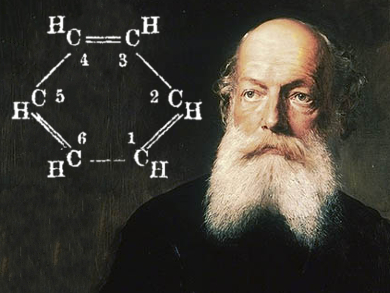Friedrich August Kekulé was born on September 7, 1829 in Darmstadt, Germany. He started to study architecture at the University of Gießen, Germany, but after hearing lectures by Justus von Liebig he switched to chemistry. He became Privatdozent at the University of Heidelberg, Germany, in 1856, Full Professor at the University of Ghent, Belgium, in 1858, and returned to Germany in 1867, joining the University of Bonn. He remained there until his retirement. Kekulé died on July 13, 1896.
Kekulé is one of the fathers of chemical structure theory, and best known for assigning a cyclic structure to benzene’s C6H6 formula, which is famously said to have come to him in a day dream. At a time with few available methods for structure determination, this had been a considerable challenge. His seminal paper on the topic was published in 1865.
He was one of the first to formalize the idea of chemical valence, especially the tetravalence of carbon. Kekulé’s insight into the structure of organic and especially aromatic compounds allowed the field to flourish. Three of his students went on the win the Nobel Prize in Chemistry: Jacobus Henricus van’t Hoff in 1901 (first Nobel Prize in Chemistry), Hermann Emil Fischer in 1902, and Adolf von Baeyer in 1905.
Friedrich August Kekulé is the answer to Guess the Chemist (37).
Selected Publications
- Ueber einige Condensationsproducte des Aldehyds (in German),
A. Kekulé,
Justus Liebigs Ann. Chem. 1872, 162, 77–124.
DOI: 10.1002/jlac.18721620110 - Sur la constitution des substances aromatiques (in French),
A. Kekulé,
Bull. Soc. Chim. Fr. 1865, 3, 98–110. - Ueber die Constitution und die Metamorphosen der chemischen Verbindungen und über die chemische Natur des Kohlenstoffs (in German),
A. Kekulé,
Justus Liebigs Ann. Chem. 1858, 106, 129–159.
DOI: 10.1002/jlac.18581060202
Also of Interest
- It Began with a Daydream: The 150th Anniversary of the Kekulé Benzene Structure,
Alan J. Rocke,
Angew. Chem. Int. Ed. 2014.
DOI: 10.1002/anie.201408034 - The Old Chemical Institute in Bonn was incorporated into the program “Historical Sites of Chemistry” of the Gesellschaft Deutscher Chemiker (GDCh; German Chemical Society). Friedrich August Kekulé worked, lived, researched and taught there from 1867 until his death.
- Ghent University, Belgium, has been presented with a plaque commemorating August Kekulé’s research there (1858 to 1867) by the Belgium section of the Royal Society of Chemistry (RSC).





Are there English translations of those papers mentioned?
I don’t think so. At that time, German was the language used in chemistry publications. Maybe Google translation can help